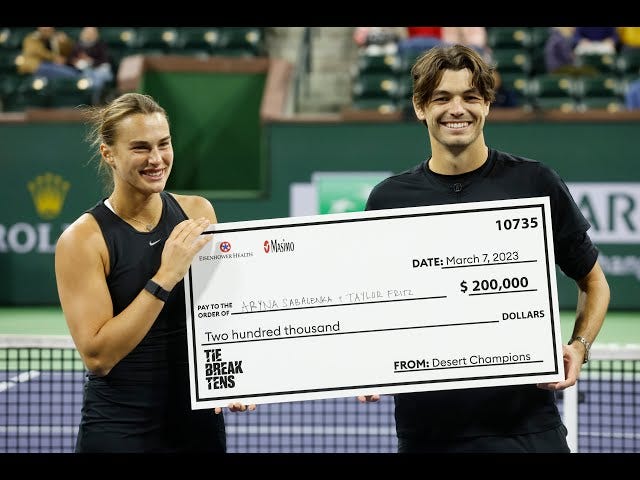Baseline: A Financial Security Lifeline
ATP unveils 'Baseline', a pioneering financial security program for tennis players
For years, the tennis governing bodies (ATP for men and WTA for women) have turned a blind eye to the financial security of its players. Tennis players have a short shelf life. Their earning capability in the tour dwindles once they cross 30 years and many players (outside the Top 50 or 150) barely make money to sustain themselves. If all the money they earn goes into paying for coaches, gear, fitness and flights, how can they take care of their family once their body becomes too old to play?
The player council has been vocal about providing financial security to its players. The ATP (governing council for men’s tennis) has introduced ‘Baseline’. Baseline is a financial security system intended to help players maintain a fair level of income. It is set to launch in 2024 as part of a three-year trial. This pioneering initiative marks a major first in the history of the ATP Tour.
"Being a professional tennis player comes with incredible rewards, but it's also a challenging journey, especially for those starting their careers. Knowing that we have a safety net through the minimum guarantee and injury protection pillars gives us peace of mind, allowing us to focus on our game and strive for success. This truly shows the ATP's commitment to the players and the future of our sport."
-Grigor Dimitrov (ATP Player Advisory Council Member)
Between 30 and 45 players are expected to receive financial support through Baseline each season, with eligibility determined based on a range of criteria. This includes a player’s ranking, career prize money earnings, and number of events played. The 2024-26 trial period will serve as an initial proof of concept, with potential to expand funding in future.
"We’re beyond excited to introduce Baseline. This initiative is a complete shift in the way tennis approaches player finances. It represents our commitment to the players and their careers - fostering an environment where they can thrive and elevate the sport. It is also just the start of what we hope to achieve. Our ambition is to expand this game-changing initiative in the years to come.”
-Andrea Gaudenzi, ATP Chairman
Comprised of three key pillars, Baseline represents a significant step towards ensuring a greater number of players can make a sustainable living from the sport.
Pillar 1:
Guaranteed Base Income - guarantees minimum income levels for the Top 250-ranked singles players each season. In case a player's prize money earnings finishes below the guaranteed threshold, the ATP will step in to cover the shortfall. For the 2024 season, these levels are $300,000 (Top 100), $150,000 (101-175) and $75,000 (176-250). This assurance will empower players to plan their seasons with greater certainty, focus on their game and invest in their teams. This includes covering the expenses of coaches and personal physios, as well as travel.
Pillar 2:
Injury Protection - supporting players who play fewer than nine ATP Tour and Challenger Tour events in a season due to injury. This progressive initiative includes thresholds set at $200,000 (Top 100), $100,000 (101-175) and $50,000 (176-250) in 2024.
Pillar 3:
Newcomer Investment - provides an additional boost to up-and-coming players as they push on in their professional tennis journey. These rising stars will have access to $200,000 of funding upon breaking into the Top 125 for the first time, paid in advance of the following season and offset against prize money earnings. This will facilitate players’ investment into their teams and resources as they break onto the ATP Tour.
Baseline feels like a good initiative and we will have wait to see if ATP would extend the initiative to players beyond Top 250 once trail concludes. We should also see if the WTA (governing body for women’s tennis) introduces a similar initiative for women tennis players.
Rohith’s Corner:
Have you tried Candy Burrito? Cotton candy filled with ice cream, chocolate sprinkles, fruits loops and pops!





Any financial support should come from the country or the county whom a player represents. It should be the state bodies who should conserve the player and look after them, not only for them but for the future generations as well.